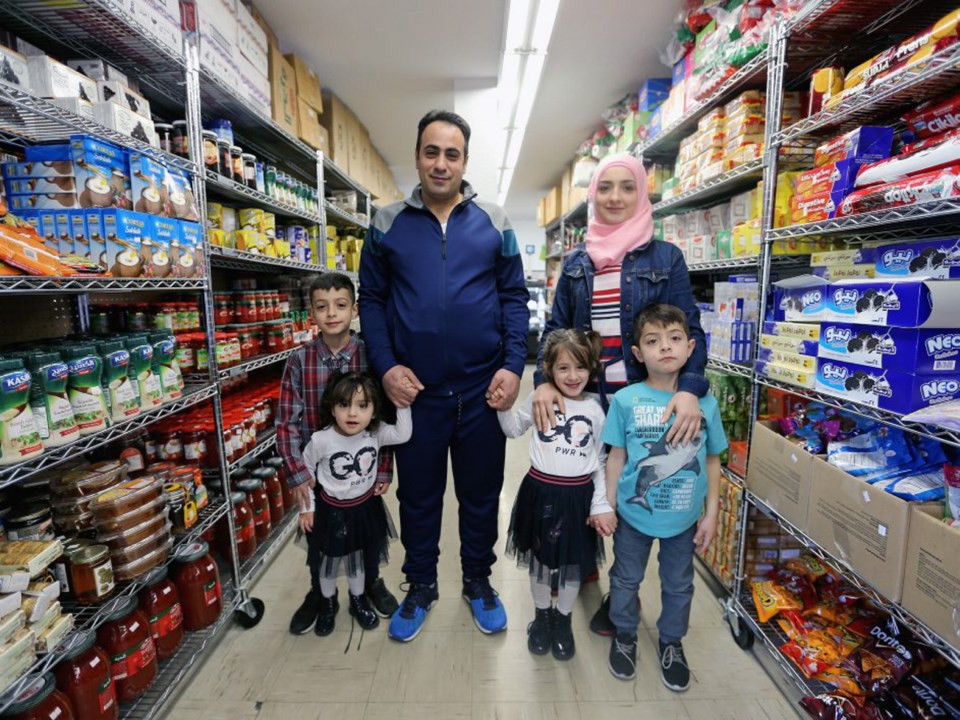When the Damascus Food Market opened on March 1 it not only added another local option for lovers of Middle Eastern food, but heralded a fresh start for a Syrian family of six who arrived here as refugees in summer 2016.
Mohamad Salem Ajaj demonstrates the resilience and determination that led his family to a new life in Victoria after travelling from Syria to Algeria, back to Syria, and then to Lebanon and Turkey in search of a safe future with opportunities for his children.
He is committed to forging a solid foundation for his family: “We have to keep going. We will not stop.”
The children’s mother, Marwa Ataya, who works in the market at times, is equally as focused: “We have to make our future. The future will not come to us.”
The market is in a high-profile location at 1395 Hillside Ave., at Cedar Hill Road.
Small-business owners know how much time and attention an enterprise demands. Long hours (the market is open from 9 a.m. to 9 p.m.) and no days off are now the norm for Ajaj.
“I need this business [to be] successful. I give my store all my time,” he said.
Products — many organic — include pickled artichokes, dried beans, herbal teas, coffee and lots of candy and desserts. There’s an olive bar, coolers with eggs, milk and butter, plus chocolate bars and gleaming utensils. Everything is halal, meaning it was prepared according to Muslim guidelines.
Fresh chicken, beef and chicken are stocked. The butcher will cut meat to a customer’s request.
Still to come: fresh fruit and vegetables. Ataya, who has just completed a food-safe course, is aiming to add a deli. “All my friends say I’m very good at cooking,” she said with a smile.
The bulk of her time is spent caring for their children — boys Mohamad, eight, and Ghaith, six, and girls Limar, four, and Mera, three.
The family is among 484 Syrians who have arrived in the capital region since September 2015, said Sabine Lehr, private sponsorship of refugees manager with the Inter-Cultural Association of Greater Victoria.
Refugees in Victoria were either government-assisted or privately sponsored, like the Ajaj family. Under a private sponsorship, a community group must raise enough money to support the family financially, typically for one year.
More than 50,000 Syrian refugees have settled in Canada since 2015 as they fled civil war in their home country.
Ajaj, 36, scrolls through photos on his cellphone, showing his bomb-damaged house and land in the countryside outside Damascus and of rubble-filled streets lined with scarred buildings.
Ajaj started his first venture in Damascus at age 18 with 20 employees. Leaving Syria meant leaving behind what had been a successful business importing lumber from China, as well as two homes.
While in Istanbul, a friend suggested moving to Canada. Ignoring warnings about the cold climate, the family landed at Victoria International Airport on July 17, 2016, where they were warmly greeted by their private sponsors, saying: “Welcome to your new home,” Ataya said.
Those sponsors became “very, very, very good friends,” she said. They are considered family now and continue to help in many ways, including navigating requirements for establishing a business.
After studying English and working in food delivery, Ajaj was keen to get back to business, taking on a five-year lease for the market.
Today, the four children happily scamper among the aisles. Their parents see more than happy faces — they see children with opportunities. Ajaj’s own father encouraged him to pursue his own interests and that’s the approach he vows to take with these youngsters.
Young Mohamad talks about becoming an engineer, said their mother, who loves listening to their dreams about the future. “I want my kids to study and go to university.”
At the Intercultural Association, Lehr said: “What we find generally in the immigrant population is that people often eventually do open businesses. They tend to be quite entrepreneurial.”
Many had businesses in their home countries. “That is particularly true for the Syrians.”
Like this family, people Lehr works with say: “We’ve got to look forward.”
“Many of them say: ‘I came here not just for me. I came here predominantly because of my kids, because my kids had no future where I was. I need to give my kids a future.’ ”
Ajnesh Prasad, Canada research chair in Royal Roads University’s school of business, said: “I think that entrepreneurship and creating one’s own business is a natural first step for immigrants who migrate overseas.”
That might be in part because professional credentials from home countries might not be recognized in their new country, he said.
In Ajaj’s case, “He has been able to take what he was doing in his country of origin and actually transfer some of those skills to his country of destination.”
A May 2018 report from the Immigrant Services Society of B.C., titled Syrian Refugee Operation to B.C.: Taking stock two years after arrival, gives a snapshot of Syrian refugees. It said 63 per cent were working in construction, manufacturing or trades. Retail, hospitality and food services accounted for 19 per cent. Close to half were seeking work, and might already have jobs.
The study did not survey self-employment. But it said: “Anecdotal evidence, as well as early results from ongoing research with Syrian refugees across Canada, show the emergence of diverse Syrian-owned businesses, including those in the catering, flooring and restaurant sectors.
“Self-employment presents an important opportunity for Syrian refugee newcomers to build on previous experience and specialized skills to provide for their families, without facing barriers with needing ‘Canadian experience.’ ”



